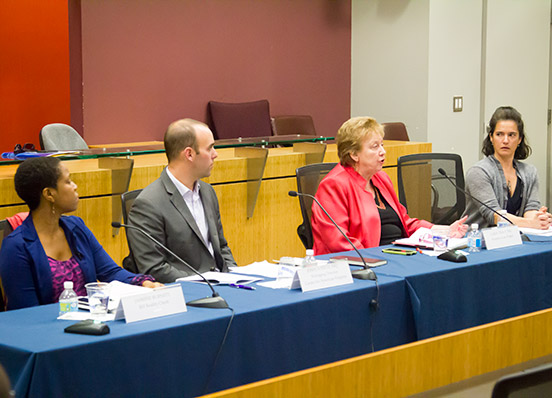Noted scholars and activists gathered at the law school on Oct. 30 for a symposium exploring the impact of rulings by the U.S. Supreme Court in the Hobby Lobby and McCullen cases on women's reproductive rights.
Professor Deborah Gordon moderated a discussion of Burwell v. Hobby Lobby, in which the Supreme Court ruled that the U.S. Department of Health and Human Services could not require closely held corporations to provide health insurance coverage for methods of contraception that violate the religious beliefs of the owners of those corporations.
Calling Hobby Lobby "one of the most dangerous decisions we've seen from this court," Carol Tracy of the Women's Law Project said the decision allows closely held corporations to impose their religious beliefs on their employees, something that has previously never been allowed in the U.S. Pointing out that the decision contradicts most precedent on corporate liability, Tracy argued "closely held corporations are corporations for every other purpose, except for this purpose, it seems." Although the decision is masked in terms of religious autonomy, Tracy claimed it is nothing more than "a fundamental attack on a women's autonomy, it's not about religion, it's about controlling women's lives."

Joshua Field an attorney at the Center for American Progress and Jasmine Burnett, an activist from RH Reality Check, agreed with Tracy, commenting that Hobby Lobby is not really a case about religious freedom but using so-called "religious rights" to undermine women's rights to reproductive health.
Historically, the Supreme Court has found that an individual should not have to conform to the religious beliefs of another, Field said.
Burnett added that the Hobby Lobby ruling will have an extremely negative effect on the physical well-being of females in the black community where there is a high rate of sexual assault and up to 83 percent of women between 15 and 44 use contraception.
Professor David S. Cohen led a discussion of McCullen v. Coakley, in which the court held that a Massachusetts law violated the First Amendment by requiring a 35-foot buffer zone around abortion facilities.
Buffer zones evolved out of a need to protect abortion patients after a long history of harassment that involved blockades, threats, physical assault and murders, said Cohen, the co-author of a forthcoming book about violence against abortion providers. What is most remarkable about McCullen, Cohen said, is that while it strikes down Massachusetts' buffer zone law, it completely ignores Hill v. Colorado, which had been the seminal Supreme Court case on a state's authority to protect abortion facility patients.
While law students who take exams are expected to cite leading cases and lawyers who file briefs must do likewise, Cohen observed that in McCullen, the court ignored its own precedent and created uncertainty as to how states may protect the reproductive rights of women poised to make one of the most personal and intimate decisions of their lives.

Jon Miller, an attorney at the Massachusetts Attorney General's Civil Rights Division, detailed how the Massachusetts legislature responded to the McCullen decision. Although McCullen did set back women's reproductive rights protections, the decision "provided a road map" of alternative ways legislators might protect abortion facilities, Miller said. For example, although the buffer zones were found overly burdensome, the court said states could look to local harassment laws and ordinances involving clear access to sidewalks and public streets for new ways to protect abortion patients, Miller said. While the buffer zones had been effective in reducing confrontations outside clinics in Massachusetts, Miller said the Massachusetts legislature has passed new legislation that addresses problems observed at abortion clinics.
Lynne Molter from the Women's Center of Philadelphia, who has escorted patients into abortion clinics herself, underscored the importance of buffer zone and other protection laws around clinics by detailing the kind of harassment women face. The protests around abortion clinics are "not about saving fetuses, [they are] about power over women through guilt and shame," Molter said, as she described instances where women have been coerced and led into a pack of protestors by someone posing as a clinic escort, or protestors blocking car doors so women could not exit their cars and enter the clinic. "Protestors do not accept the word 'no'," Molter said, and "situations escalate."
In the keynote address, Slate Senior Editor Dahlia Lithwick traced the history and impact of women on the Supreme Court, from the 1981 appointment of Justice Sandra Day O'Connor to the existing trio of Justices Ruth Bader Ginsburg, Sonia Sotomayor and Elena Kagan.
Despite the increased presence of female justices, recent rulings suggest that women "are more invisible than when an all-male court handed down Griswold and handed down Roe," Lithwick said, referring to landmark cases that struck down restrictions on contraception and abortion decades ago.
Although Hobby Lobby, McCullen and other recent rulings amount to "an all out massacre in terms of women's rights and freedoms," Lithwick said history suggests that the presence of three women on the court will likely have an eventual impact on the male justices' thinking.
After all, Lithwick noted, Ginsburg was the lone woman on the court in 2009, when male justices during arguments in Safford Unified School District v. Redding seemed to regard the strip-search of a 13-year-old girl as "a Porky's punchline." Following Ginsburg's public dressing-down of her colleagues, a 7-2 majority ruled that school officials had violated the girl's rights, Lithwick said.
The event was sponsored by the Law Students for Reproductive Justice, Women's Law Society, Health Law Society, American Constitution Society and the National Lawyers Guild.